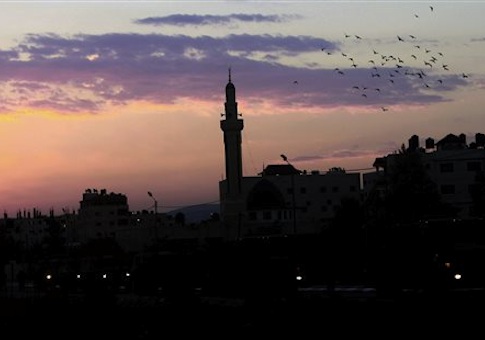JERUSALEM—The recent Gaza War has proven the impossibility of a two-state solution to the Israeli-Palestinian problem, Israeli Defense Minister Moshe Ya’alon declared this week.
Ya’alon, the most powerful minister in the Cabinet after Prime Minister Benjamin Netanyahu, was departing from the two-state formula Netanyahu endorsed five years ago and which has become a touchstone in the international dialogue on the Middle East, particularly in Washington.
Following the 51-day war in Gaza, the notion of an independent Palestinian state existing alongside Israel has become absurd, the minister told a security conference this week at a Tel Aviv think tank, the Institute for National Security Studies.
Israeli security forces must remain a permanent presence on the West Bank, he said, if the area is not to be turned into a platform for rockets and mortars fired into Israel, like the Gaza Strip. Last month, militants fired thousands of rockets and shells from Gaza into Israel. Unlike Gaza, remotely located in the south, the West Bank lies opposite the central part of Israel.
"In this situation, can one even consider restricting the freedom of action of the defense forces in (the West Bank)?" he asked. "How can one rationally reach this conclusion?"
He said that between May and July, security forces operating in the West Bank took into custody more than 90 Hamas operatives who were planning both to attack Israel and overthrow the more moderate Palestinian Authority.
If Israel withdraws from the West Bank, the minister said, it would become a "Hamastan" whose mortars could easily reach Israel’s international airport outside Tel Aviv as well as military bases. Although Israel’s Iron Dome anti-rocket system succeeded in downing the bulk of rockets headed for built-up areas, there is as yet no system for intercepting mortar shells.
If Israel leaves the West Bank, Ya’alon warned, it would be used, as in Gaza, by global jihad organizations, which would pose a threat not only to Israel but also to neighboring Jordan. "Could it [Jordan] survive that?" he asked.
For the first time since Netanyahu publicly adopted the two-state formula, he did not raise it at the United Nations General Assembly this week as a hoped-for eventuality as he has in previous years. Instead, he called for a fresh approach to peace—"new directions"—involving moderate Arab states. However, in his meeting with President Obama in the White House the next day he did reiterate the two-state formula in the presence of reporters, but he added that given the ongoing turmoil in the Middle East the Palestinian question "is not the main issue anymore. It’s secondary."
Ya’alon, in his talk this week, said that Israel's ability to continue to function almost normally during the war demonstrated its strength and increased its strategic deterrence. For a long time, he said, Israel's reluctance to respond forcefully to provocation had projected weakness and had earned from Hezbollah leader Hassan Nassrallah the disparaging comparison to a spider web that could easily be swept away.
In the Gaza war, he said, Israel showed that it could go through a protracted assault with relative equanimity. Ten minutes after sirens sounded, residents had resumed their lives and drastic damage to the economy was avoided, he said. "We were dragged into this war and we did not break. Yes, 51 days, 4,500 rockets and mortars, but in the end, as a society, we projected strength." In the end, it was Hamas that accepted Israel's terms for the ceasefire, he added.
